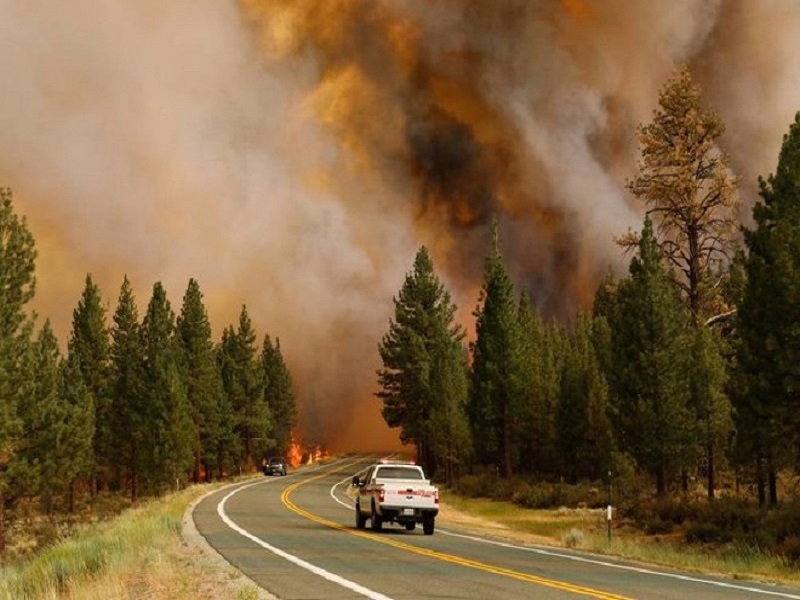12-10-2014 – Insurance Panorama
The exclusion of any responsibility for an Act of God is commonplace in many contracts offering services, particularly in the typical conditions of carriage used in the haulage industry. But do we really know whether it has any real worth in a legal dispute? Do we know that it has no religious connotation whatsoever?
The absence of any connection with religion was described in the English case of Pandorf v Hamilton 1886. In that case the judge stated “An act of God is not one in the ecclesiastical and biblical sense.”
Why it was called an Act of God is unclear but it’s reasonable to hypothesise that in the fervour of Victorian religion, which was considered more important than science, something that could not be understood – that was beyond the wit of man to comprehend – would have been blamed on the wrath of the Almighty.
The defence of Act of God is used only rarely because of the extreme forces it is used to described. A mere storm, heavy though it may be, does not constitute an Act of God as it is recognised in English law. So how does English law describe it?
The leading case on Act of God, in which this defence was pleaded successfully, is Nichols v Marsland (1876) in which the judge described it as, “something which occurs in the course of nature, which is beyond human foresight, and against which prudence could not have been expected to provide. It is something in the course of nature so unexpected in its consequences that the damage caused must be regarded as too remote to form a basis for legal liability.“
In Nichols v Marsland there had existed artificial ornamental lakes on the defendant’s land for many years. An extraordinary rainfall, “greater and more violent than any within the memory of witnesses,” caused the streams and the lakes to swell to such an extent that the artificial banks burst, and the escaping water carried away four bridges belonging to the county council. Nichols, the county surveyor, sued under the strict liability rule in Rylands v Fletcher (1868) but the judge held that the defendant was not liable for this extraordinary act of nature which she could not reasonably have anticipated.
in Sedleigh-Denfield v O’Callaghan (1940.) Lord Maugham said, “This defence is only available in the case of rain so exceptional in amount that no reasonable man could have anticipated it. A defendant may still be liable if the force of nature was reasonably foreseeable or if the state of affairs created by the force did not immediately lead to the interference.”
If one is to consider the circumstances of the loss described in Nichols v Marsland it would be entirely reasonable to suggest that, even though Act of God is a firm defence to liability in English law, the reality is that insurers have been providing insurance against this risk since the early days of insurance and have paid the claims arising from an Act of God. This may seem somewhat at variance with a proximate cause that is pleaded as a defence in our case law but, if one is to consider the definition of Act of God and the circumstances described in Nichols v Marsland, coupled with historic events that have happened in the United Kingdom, as well as in other countries, one can see how insuring against an act of the Almighty, and paying claims for its consequences, has been the reality of life in this country for a very long time.
Let me cite two catastrophic events in England, separated only by the passage of time, that have caused death, injury and devastation, and all of which could reasonably be attributed to an Act of God.
The Lynmouth Flood Disaster of the 15th August 1952 occurred after two weather fronts, one from the mid-Atlantic and containing heavy moisture, and the other from the Brittany area of France, containing warm thundery air combined, with devastating consequences, to create huge amounts of moisture in the air, exacerbated by cold, moist and unstable air ascending up the north facing slopes of Exmoor, introducing more moisture into the already heavy raining area. It is thought this may well have been decisive in producing the excessive rainfall in the Lyn catchment area.
The catchment area of the Lyn river totals 102 sq, kilometres, much of which is plateau drained by steep-sided combes (deep valleys or hollows in the hills). Some of the plateau is covered by moorland grass growing from wet, peaty ground and other parts of it by heather and bracken on well drained soils. On the smooth convex hills there were few storage dips and ponds, which were quickly filled by the first rains. When the soil profile became completely waterlogged, saturation and surface run-off occurred.
From this point the flow of water would have been between 3 to 6 metres per second. Combined with the narrow valleys the flow of water, together with earth and rock debris, trapped boulders and trees, this resulted in a 12 metre high wave travelling downstream at 30km per hour.
The result of this natural phenomenon was that 34 people died, and houses, other buildings, roads, farms and the general infrastructure were destroyed or damaged.
The whole event arose out of nature, without interference from man.
(Source: www.geographyalltheway.com)
The Boscastle Flooding of the 16th August 2004 was caused by a combination of heavy, thundery showers, themselves remnants of Hurricane Alex which had crossed the Atlantic, that had developed across the South West and aligned themselves with winds that had converged along the coastal high ground around Boscastle, creating cumulonimbus clouds 12,192 metres high and kept them stationary for many hours. Slow moving thunderstorms caused localised extreme rainfall over north Cornwall. The rain was extreme in both its intensity and duration: up to 200 millimetres fell in 24 hours. Adding to all this, storms grew out of a large depression area that dominated the eastern Atlantic that day. It had sucked in pulses of warm, moist tropical air, including the remnants of Hurricane Alex. These storms were channelled along the coast by a strong line of convergence – a line where a moving airflow meets an opposing one and the air is forced upwards. Higher air temperatures onshore may have reinforced this uplift. Storm showers along the whole north Cornwall coast all started at about the same time, 1pm. It is thought likely that this synchronised timing was due to the convergence along the coast. The storms moved slowly up the coast, shedding their load of thousands of tonnes of rain.
An estimated two million tonnes of rainwater flowed through Boscastle that day, the steep sided valleys, known as “flashy catchments”, acting as huge funnels and possibly producing true flash flooding. During the afternoon of the 16th, a conservatively estimated 1,422 million litres of water fell in just 2 hours – over 197,500 litres per second. At its peak, in a 15 minute time-span, it is estimated that over 632,000 litres of rainwater fell in any one second.
The physical and economic damage having been widely reported in the media, I have not included the bare statistics. I believe the thing speaks for itself.
Source: geographyalltheway.com – The Boscastle Floods – 2004
As can be seen from the case law quoted earlier, the Act of God defence has no religious connotation. It seems to stem from the religious fervour found in the Victorian era when an overwhelming force, that could not be identified by normal human understanding, was put down to it being due to the wrath of the Almighty, perhaps displeased with the sinners upon the earth. Come what may, the Almighty took the rap, as they say in some countries.
Considering that insurers have, in reality, been paying claims for loss and damage caused by extremes of nature, what value is the Act of God defence to the industry? The answer to that question is twofold. Firstly it can, given the right circumstances, be pleaded as a defence when dealing with claims made against bailees of goods, such as haulage contractors, whose vehicles may get caught up in a force of nature so great and unexpected, that it is classed as an Act of God.
The conditions of carriage of the Road Haulage Association, the leading haulage association in the United Kingdom, contain an exclusion of loss or damage caused by an Act of God provided the carrier has used reasonable care to minimise the effect of Act of God. So how could such a defence be justified? Very easy, is the answer. The nature of haulage work is such that lorries have to operate in all sorts of weather, good or bad, in their role as the main conduit for the delivery of all sorts of goods from supplier to customer. In many cases the customers are the big supermarkets, who operate on a ‘just-in-time’ system of replenishing their stocks in line with the rate at which goods are taken from the shelves. They do not have spare stock lying around. Their warehouses are the vehicles of haulage contractors. Neither the haulage contractor nor the supermarket can allow bad weather to hinder the smoothing running of their stocking and re-stocking operations.
Under the CMR Convention, which governs the legal liability of road carriers for reward whose vehicles carry goods across an international boundary between two countries, one of which must be a signatory to the CMR Convention, there is no specific Act of God exclusion but in exceptional circumstances any loss or damage caused to goods in circumstances which meet the criteria for an Act of God, such evidence might be put forward to support the basic defence to liability under CMR, the Article 17.2 defence of “circumstances the carrier could not foresee, the consequences of which he could not prevent.” The possibility of the defence being used in such circumstances should concentrate the minds of the owners of goods in transit by road and encourage them to insure those goods against all risks to their full values, because the road carrier may be able to defend the claim in the event of dreadful weather conditions, such as a hurricane – an act of God if ever there was one – in which case it would not have to pay any compensation to the owners of goods so damaged.
A carrier who has not used conditions of carriage still has considerable protection in law because, without private conditions of contract, he is usually classed as a Common Law carrier. At common law the duty of the carrier is to exercise reasonable care to protect the goods in his custody against loss or damage. If a force of nature is extremely severe, he may not have been negligent, so would not be liable, even if the Act of God defence does not stand.
Secondly, it can be used in defending a business or individual against claims made by third parties where an Act of God has caused damage so extensive that it has affected neighbouring land and property. Even if it does not seem likely to provide strong enough to go before a court, the mere threat of the defence being put forward may encourage a negotiated compromise settlement with the other side. This was potentially the case in the year 2005.
In June 2005, and without warning, flash flooding of great force occurred in the area in and around Sutton-Under-Whitestonecliffe, in North Yorkshire, England. Fortunately, no lives were lost although some people were very lucky not to be drowned. However, substantial damage was caused to land, buildings, cars and roads, most of which had to be rebuilt or replaced.
The damage to one business was such that it mirrored the contrasting cases of both Rylands v Fletcher (1868) and Nicholls v Marsland (1876). The violence of nature on that occasion was so powerful that it had not been known before in the area in living memory. The business in question was a fish farm. The force of the flood waters, and the forces they carried with them, destroyed all the fish beds and the fish in them, carrying much of the debris downstream. It was a complete write-off. Barely had the flood waters subsided when a local angling group claimed that this debris had ruined the river in which its members fished regularly. Its members, it said, were considering a claim for compensation. Fortunately, the threats came to nothing but that episode shows how quick people are to exploit the compensation culture now inherent in this and other countries, regardless of the misery being suffered by many other people. Had the claim been pursued, a prime facie argument for the Rylands v Fletcher rule on strict liability could have been put forward. After all, the fish farm was created artificially, so it was a non-natural use of the land, and we know that confined water can cause substantial damage if it escapes. That was the substance of the allegation made by Nicholls against Marsland in the 1868 case. On the other hand, the force that caused the water to escape could reasonably have been argued as an Act of God. It would then have been for the court to decide the issue on the merits of the case. Nevertheless, circumstances such as this show that the little used Act of God defence may now be a useful tool of defence in the litigation conscious age in which we now live, even if it only ends up as a bargaining tool in a compromised settlement, and that perhaps Act of God is about to enjoy a renaissance.
I strongly believe there is a prime facie justification for the use of the Act of God defence where circumstances that meet the criteria of the case law cited have arisen, or may arise at some time in the future. There are commercially sound reasons for applying it and for letting the market know that it may be applied in the future. However, please note that it is for use only in the defence of a claim from a third party alleging negligence. It is not to be used as an exclusion in a policy of insurance covering property, and that includes one covering marine cargo! After all, in reality an Act of God is just a bad storm, a very bad storm. We cover the risk of storm. It’s one of the perils of the sea referred to in the Marine Insurance Act 1906.
Warning
This paper is based upon opinion only. It is designed to challenge existing market thinking and practice. It should not be used as a guideline in any legal dispute. It is for individual underwriters and their employers to decide upon the merits of each case before deciding whether or not to apply an Act of God, or similar, defence.






